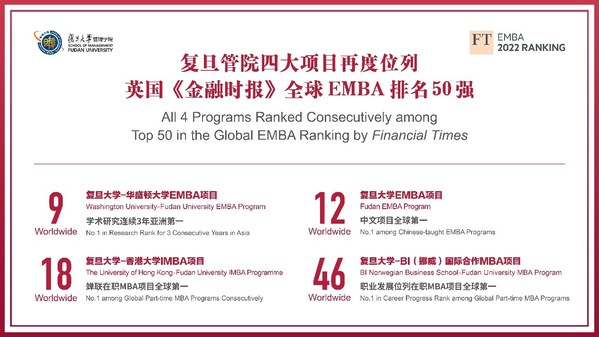Three Fudan Programs make the list of Financial Times' Top 20 Global EMBA Programs
- Written by PR Newswire
Four programs ranked among the global top 50 for three consecutive years
SHANGHAI, Oct. 24, 2022 /PRNewswire/ -- In the latest FT global EMBA ranking published on October 17, 2022, four programs of the School of Management, Fudan University (FDSM) were ranked among the global top 50 for the third consecutive year. FDSM was also the only business school on the list with three programs placing among the top 20. The School has received international accolades for its excellent performance and leadership role in Chinese EMBA education.
Four programs on the list garner many world firsts
This year, four FDSM EMBA programs were named in the rankings: the Fudan EMBA Program, the Washington University-Fudan University EMBA Program, the University of Hong Kong-Fudan University IMBA Programme and the BI Norwegian Business School-Fudan University MBA Program.
The results showed that the Fudan EMBA Program finished 12th globally, ranking No. 1 among Chinese-taught EMBA programs. The Washington University-Fudan University EMBA Program came in 9th worldwide, as well as No.1 in Research Rank for three consecutive years in Asia. The University of Hong Kong-Fudan University IMBA Programme was ranked 18th globally and took the top position among Global Part-time MBA Programs consecutively. The BI Norwegian Business School-Fudan University MBA Program was placed 46th globally, as well as ranking first in Career Progress Rank among Global Part-time MBA Programs.
FDSM delivers consistent excellent performance in the ranking with the largest size of alumni responses
Since 2006, when the Washington University-Fudan University EMBA Program made its first appearance in the rankings, FDSM has participated in the FT annual event for 17 consecutive years, starting with one program and, over time, expanding to include multiple programs, including both English-taught and Chinese-taught programs. Its programs' overall ranking has been rising steadily in the past years. Today, FDSM is on a par with the U.S. leading business school, Kellogg School of Management at Northwestern University, as both schools have four programs ranked among FT's global top 100. Such achievements are a strong reflection of the School's efforts in promoting research and teaching quality in business education.
Most notably, the Washington University-Fudan University EMBA Program is not only the first among the EMBA programs in Chinese mainland to enter the FT rankings, but also the one with the longest history of participation in the annual event and the largest number of appearances among the global top 10. The program was ranked 8th in the world in 2006 when it entered the ranking for the first time and has since been placed among the top ten for 12 times.
On the occasion of the 20th anniversary of EMBA education in Chinese mainland, Fudan EMBA Program again delivered good results in the FT ranking, which is not only an affirmation of the prime role assumed by Fudan EMBA Program in leading the growth and development of China's EMBA education and nurturing excellent management talents for the country's economic development, but also a strong encouragement to the School to continue to make contributions to creating and shaping China's future business culture.
Since its participation in the FT Global EMBA Ranking, FDSM has requested that all alumni participate in the ranking survey during the three years following graduation. Throughout the years, more than 5,000 graduates from FDSM have been involved in the rankings. The School has always valued the fairness and independence of ranking results and subjected itself to evaluations by international authoritative institutions in an objective, truthful and comprehensive manner. FDSM's strict adherence to the ranking's protocols has won global accolades.
Sci-tech Innovation (STI) is pushing the limits of Chinese management education
Chinese management education programs don't participate in the global rankings solely for the sake of a better position. They see the rankings as a result of the efforts that have been made. Xiongwen Lu, dean of FDSM, said, "Our goal is to nurture internationally competitive talents for the economic development of China and the world."
Responding to China's innovation-driven development strategy, FDSM took the lead in launching a Sci-tech Innovation (STI) Strategy and establishing a STI Office as part of its commitment to transformation in education. The School undertakes extensive research into STI management while training a team of talents specifically for the field, in the belief that STI brings a better future and that management empowers STI. Furthermore, a number of special STI management researches were conducted, the Sci-tech Innovation Entrepreneurship Camp and the Fudan MBA Sci-tech Innovation Youth Camp were launched, and a series of forums were held together with other resources being explored to build a STI ecosystem alongside industry chains, empowering the development of STI firms.
"China's management education has much room for growth. The number of MBA and EMBA students in the US has continued growing and peaked between 170,000 and 180,000 every year, while the figure in China has not seen significant rise over the past decade. China's economic scale is catching up to that of the US, and the size of MBA and EMBA talents needs to do the same. In the next 20 to 30 years, China's management education is expected to be more connected to the world. This is not only the inevitable result of China's rise, but also the natural outcome of the world paying more attention to China," says Dean Lu. "Chinese management education must become more dedicated to STI firms. While promoting the localization and modernization of classical management theories in China, we also need to develop our own systematic STI management concepts, cultivate high-quality management talents, empower students with creativity, entrepreneurial knowledge and innovative skills, and by doing so, establish the leading role of Chinese management education in the world."
Read more https://www.prnasia.com/story/archive/3904883_CN04883_0















